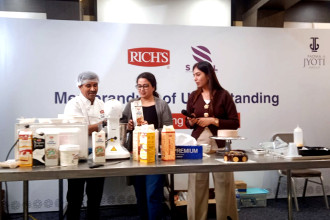KATHMANDU: A panel at the NAIMA Nepal Mobility Expo 2025 on Friday addressed Nepal’s mounting road safety crisis and explored practical steps to curb fatalities and injuries.
The session was led by Saurabh Jyoti, board member of Nepal Automobile Importers and Manufacturers Association (NAIMA) and chairman of Padma Jyoti Group and Syakar Trading Co.
Panel members agreed that a coordinated, data-driven strategy is urgently required to reverse the country’s rising toll of traffic collisions. Speakers included Manoj Kumar Bisht, Head of administration and traffic enforcement for the Kathmandu Valley Traffic Police; Dr Rohit Baluja, President of the Institute of Road Traffic Education (IRTE), New Delhi, and member of the United Nations Road Safety Collaboration; Er Arjun Jung Thapa, former government secretary and director general of the Department of Roads; and SSP Navaraj Adhikari, senior superintendent of police (SSP) and Head of Kathmandu Valley Traffic Police Office.
Dr Baluja highlighted India’s Department of Traffic Engineering as a global exemplar in road user safety. “We conduct comprehensive safety audits and install essential road fixtures. These interventions have measurably improved traffic flow and reduced collisions,” he said.
The panellists agreed that a scientific, evidence-based approach could significantly minimise accidents, noting that driver negligence and speeding remain the leading causes. They urged alignment with Sustainable Development Goals 3, 9 and 11, arguing that efficient transport infrastructure underpins a resilient economy.
Er Thapa criticised fragmented policymaking. “Coordination is a problem. Each sector sees itself as the leader and lacks the mindset to cooperate for the country’s benefit,” he warned, calling for a unified national framework.
Delegates noted that a Road Safety Action Plan drafted in 2013 remains unimplemented. Although enabling legislation was approved and a steering team appointed, the initiative stalled and never moved beyond its initial phase.
A fresh attempt to establish a statutory Road Safety Council is underway, but final approval remains pending. In the meantime, authorities have continued to strengthen and enforce existing traffic regulations.
SSP Adhikari drew attention to Kathmandu’s unique challenges. “We operate in a culturally and traditionally rich city. Road widening is often impossible in historic areas, so the Nepal Police have had to rely on manual interventions wherever we can,” he explained.
Reflecting on shared accountability, NAIMA Board Member Jyoti added, “We always complain about the government, but individuals are also responsible for traffic safety. As members of NAIMA, we accept that we too share some of the burden.”
He said, “People, vehicles and infrastructure lie at the heart of road safety. NAIMA stands ready to collaborate with all organisations and institutions to raise awareness and drive change.”
The discussion closed with consensus on three immediate priorities: updated legislation, a fully empowered Road Safety Council and comprehensive road-user education. Delegates agreed that these measures alone could transform Nepal’s safety record.






